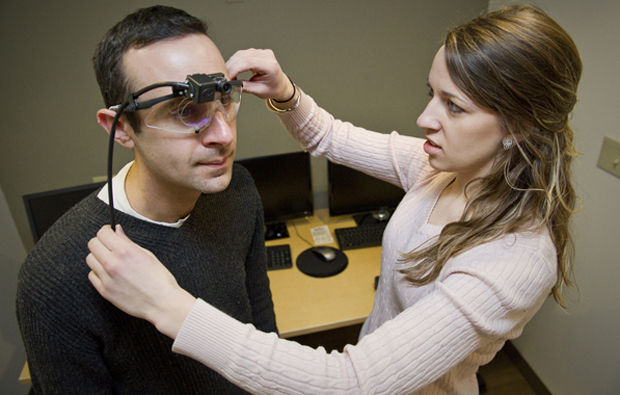Aging studies suggest older people are happier

We get wrinkles. Our hair turns gray, or we lose it altogether. Our job prospects diminish and our chances of incurring disease increase. Researchers across the globe focus their efforts on increasing our life span because so many of us believe getting old stinks.
But that may not be so, according to Derek Isaacowitz a newly appointed associate professor of psychology in the College of Science. Contrary to popular opinion, he says, older people are happier than their younger counterparts.
“Self-report studies of happiness typically find that older people are happier,” Isaacowitz explains. But for the psychologist, who joined the Northeastern faculty after spending a decade at Brandeis, self-reporting is not enough. He wants to know why older people are happier.
To tackle this question, he employs a state-of-the-art testing method not typically used in aging research: eye tracking.
Eye tracking, he says, follows a participant’s eye movements by taking 60 snapshots of his or her pupils each second. Isaacowitz couples self-reports of mood with eye tracking data to pinpoint exactly what a person is looking at while rating his or her mood.
“We can analyze data in a moment to say, ‘how does what you’re looking at relate to what you feel?’” Isaacowitz says.
Results revealed that older and younger participants might regulate their emotions in vastly different ways. As Isaacowitz puts it, “One way of regulating emotion is to change your thinking about something, to see something upsetting and say ‘no’.” This seems to be the strategy of most younger test subjects.
On the other hand, older people tend to look at negative images less often, possibly indicating that they regulate emotion by distracting themselves from negative stimuli.
Isaacowitz says this makes sense, since the elderly tend to have fewer resources than the young: “If I made you really tired or gave you something else to do, it would be easier to distract instead of reappraise.”
While Isaacowitz’ research has already confirmed a cognitive difference between older and younger people, many questions remain about how this difference may relate to the role of age in regulating day-to-day emotion.
Isaacowitz was eager to join the Affective Science Institute at Northeastern and help advance the university’s strength in aging research. He says his lab on campus will conduct a number of new studies, including an analysis of subjects in a more natural environment. “We’ll be nicely set up to do that in the lab here,” he says.





